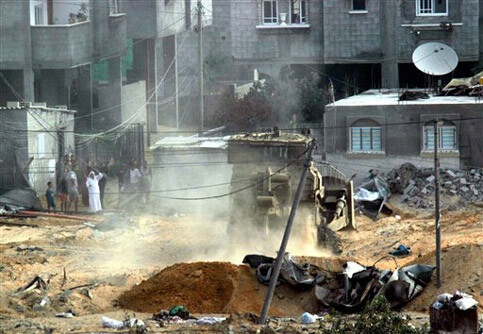Badil 8 October 2004

Palestinian refugees who are both homeless and stateless with none of the legal protections of citizenship in a country have been excluded from protection.
Governments usually guarantee protection for their citizens: basic human rights and physical security but Palestinians have no state or international body to provide for their protection. A group of non-governmental organizations, in a statement to the UNHCR Executive Committee meeting in Geneva 4-8 October, drew attention to the “continuing plight of millions of forcibly displaced Palestinians”.
If citizens of a country become refugees, their safety net is gone. The United Nations High Commissioner for Refugees has a mandate to help governments protect refugees, protection that lasts until a viable and lasting solution to their predicament is found. The perferred solution is voluntary repatriation in safety and dignity.
But Palestinian refugees who are both homeless and stateless with none of the legal protections of citizenship in a country have been excluded from this protection regime. Protection includes promotion of human rights, issuing of identity papers and travel documents and providing for freedom of movement and access to employment, basic housing, welfare, education and other governmental services.
Protection gap
At this year’s meeting of the UNHCR Executive Committee, a group of NGOs, that included BADIL, jointly presented a statement on protection. While reaffirming that protection is the primary responsibility of States, they drew attention to “the ongoing plight of millions of forcibly displaced Palestinian. Their situation is unique amongst forcibly displaced persons, as millions of them fall into a protection gap with no access to any form of international protection.”
The NGO submission called on the UNHCR and governments to ensure protection under the 1951 Convention to Palestinian asylum-seekings, in light of Article 1D of the Convention. “We also support efforts of the Council of Europe and a growing number of states to give effect to this recommendation.”
The UNHCR Executive Committee is made up of 66 countries which meets every autumn to review and approve UNHCR programs and budgets and advise on refugee protection matters.
BADIL reports on initiatives
In a paper presented to an NGO consultation before the UNHCR Executive Committee, BADIL reported on its initiatives in the area of protection which included bringing together international experts and agencies to review the ‘protection gap’ relating to Palestinian refugees.
BADIL recommended that countries which have not incorporated Article ID of the refugee convention into national legislation should do so; Palestinian refugees should, at minumum, be recognized as refugees vis-à-vis Isreal under Article ID as recommended by UNHCR and the Council of Europe; countries should grant them a complementary form of protection which entitles them to formal legal status and basic civil rights; and Palestinian refugees must not be returned to countries in which there is no guarantee of effective protection.
BADIL also called on the international community and the United Nations to continue its search for durable solutions for their situation. International assistance, protection and the search for durable solutions consistent with international law and relevant UN resolutions, said BADIL, are part of a continuum and should not be seen in isolation.
European NGOs and the European Council on Refugees and Exiles (ECRE), said BADIL, should encourage the Council of Europe to follow up on its 2003 recommendations which included the holding of an international conference dedicated solely to the question of Palestinian refugees. Such a conference, says Badil, would provide a platform for an in-depth study by states, the UN and NGOs of current protection gaps as well as concrete and concerted efforts to remedy such gaps.
The NGO consultations, held before the annual UNHCR Executive Committee meeting attracted some 200 non-governmental organizations. The consultations were held in Geneva 28-30 September.
Related Links
NGO Submission, Agenda Item 6 (4 - 8 October 2004)